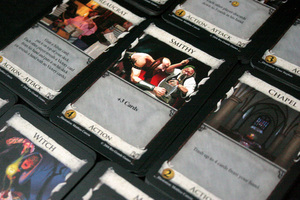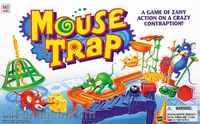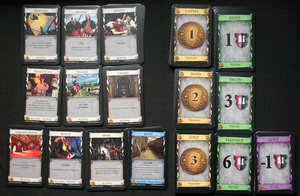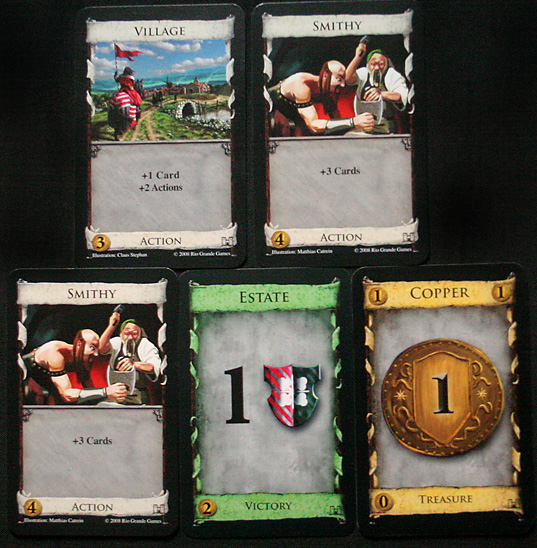Games that let you set systems into motion

Mike Hulsebus | Contributor
We continue our look at boring mainstream board games and their alternatives by looking at Mouse Trap, that game that everyone owned but no one played. Sure, you occasionally got it out, but you never legitimately played it. Then, for those of you that still love the excitement of setting something into motion we’ll look at my favorite card game, Dominion.
In Mouse Trap, the owner of a mouse-infested house (presumably Rube Goldberg) decides the best method for capturing mice is leaving out a bunch of random objects (a boot, bucket, bathtub, cage, giant steel ball) and letting the barbarous mice destroy themselves. Players advance around the board as little mice, slowly assembling the contraption the very machine that shall bring about their destruction.

When the great machine is assembled, the game switches to a mode where all the remaining mice are endlessly circling the great cage trap until one of the mice happens to set off the trap at a time when at least one of the other mice is under the game. That mouse is eliminated and play continues as they spend turn after turn moving around in that same circle as luck of the dice randomly determines who lives and who dies. It’s basically Russian roulette for mice, and you could just as well determine the winner of the game at the start by rolling a die. On a 1 through 6, no one wins because you actually considered playing Mouse Trap.
But Mouse Trap isn’t about playing Mouse Trap so much as it is about playing with Mouse Trap, having fun setting up a system and then watching it succeed.
On a similar note, I want to talk about Dominion. Not because Mouse Trap and Dominion share many (or any) similarities, but because when you get your deck going in Dominion, it’s as exciting as turning that crank or hitting the first domino of a series: there is something exciting about building something and then watching it accomplish what you wanted it to.
Dominion is a card game by Donald X. Vaccarino published by Rio Grande Games in which two to four players attempt to build a deck of synergistic cards by purchasing cards from a common pool and adding them to their own deck. Does that sound boring? Yes. Is it? No.
I recently had the opportunity to demo the game and was so taken with it that I have since bought it and played whenever I can get players together. And while I’m not saying if you love to hate that Mouse Trap you’ll love Dominion, I am saying that I think that Dominion is a great, easy-to-learn game that just about anyone can enjoy. Unlike some of my favorite board games, Dominion doesn’t have a two- to four-hour time commitment. And, thankfully, unlike other great card games like Magic: The Gathering, Dominion doesn’t require a huge monetary investment for a lot of replayability.

Mike Hulsebus | Contributor
It works like this. Players begin with a small deck of three estate cards and seven copper cards that represent their meager starting dominion that they preside over. In the middle of the table, 10 Kingdom cards are available for the players to purchase with those coppers.
On your turn, you can do the following:
- Use one action card
- Buy a card to add to your deck
- Discard everything you didn’t use
- Draw five new cards as your new hand for next turn
Since we don’t start out with any action cards in our deck, all we can do on our first turn is buy something using the coppers in our five-card hand. So on my first turn I might spend three copper to buy an action card called Smithy which reads:"+3 Cards." I don’t get to use it yet though; this card goes into my discard pile. When my original deck runs out, my deck gets shuffled and Smithy will show up in my hand. I can use that card as my action to draw additional cards, meaning I could enter my buy phase with extra cards and hopefully more money with which to buy better, pricier cards to put in my deck.
Players spend the game buying cards that, when combined, help them speed through their deck, draw extra cards, buy better cards and take extra actions. Consider this hand:

Mike Hulsebus | Contributor
We are mid game and I have built a deck around drawing as many cards as I possibly can each turn. So this turn, instead of just playing a Smithy and getting three extra cards, I can play my Village card to draw a card and take two extra actions. For my first extra action, I can use a Smithy to draw three extra cards and then evaluate my new cards to see if I want to use my second action (from the Village) to play another Smithy or play a different card that I drew. If I am fortunate enough to draw another Village, I can play that and get even more actions to use on my turn.
We still need to discuss how you win. The end of the game happens when players either have bought all the Province cards or when supplies of three cards types have run out. Notice how the Estate card above has a one on it? That is one victory point, and victory cards have points ranging from one for the Estate to six for a Province. When the game ends, players count up all of the victory points in their decks and whoever ends with the most points is the winner.
The interesting thing strategically about the game is that these victory cards don’t accomplish anything during the game, but you need to have them in your deck at the end to win. So players have to weigh if it is better to spend their money buying victory points that will take up space in their deck or to buy cards that will help them do what they want their deck to do.
And finally, by far the best thing about the game is that it comes with 25 different Kingdom cards even though only 10 are used each game. Given the ways that the cards interact with one another, each game plays out different when certain cards are present. In one game, players could have access to Moat cards to protect them from discard attacks, but in another game, Moats may not be available, making attack cards extra effective. What worked one game may not work the next and players must adapt their strategies accordingly.
Commonly, card games of this weight are relatively cutthroat and require players to play in direct opposition to one another: You attack me with your creature, I lighting bolt him and kill him, you are discouraged because you liked that guy. Dominion has cards called attack cards, yes, but even when I get hit with a witch’s curse, Dominion still feels like a game more focused on creation rather than destruction, and I think that’s one reason why I feel it appeals to a broader audience than, say, Magic: The Gathering.
I think that Dominion is a game that belongs in every game collection. I realize that my game tastes are going to be different from yours and that no game is perfect, but it is worth noting that my wife, who is by no means a hardcore board gamer, also finds the game fun. A game of Dominion takes about 30 minutes to play, is easy to explain, and a whole lot of fun and accessible to anyone old enough to read to read the rules and understand how the cards let you break them (the publisher recommends ages 10+). I know that last week I said that Spy Game was perhaps my favorite card game, but that was before Dominion.
What originally kept me away from the game was the general look of it, and I hope that I won’t keep you away either. There's nothing wrong with the art, but I have seen a lot of fantasy-themed card games, and after a while they all start to blend together, so I’m glad that someone sat me down and had me play Dominion. If you're interested in the game, both Get Your Game On and Amazon will be able to assist you.
If you could sit people down to play a really fun game that you love, what would it be? Let me know in the comments. See you next Monday for an all new review.
Mike Hulsebus has only played one by-the-rules game of Mouse Trap and has been known to lightning bolt a few orcs here and there. He will be happy to respond to any emails to mikehulsebus@gmail.com between imagining what Dominion combos might make the best deck.


Comments
Sam Oxby
Fri, Nov 23, 2012 : 4:13 p.m.
The mechanic of this Dominion game sounds similar to that of the excruciatingly painfully expensive Civilisation Board game - is that a fair estimate? Only obviously without the board and extra icon pieces etc? I've been increasingly getting into games which are card based, or ones that have the card aspect to them. My most recent purchase was that of Ankh Morpork, the board game based on the Terry Prachett books, from http://www.henchmans.com/, which again heavily weighted on card play. Would highly recommend this game, quick and easy to pick up, great fun and always a different game!
Michael Tiller
Tue, Mar 23, 2010 : 12:54 p.m.
I've got a decent game collection (probably close to 40 or so) and I'd have to say that Dominion has far and away the best fun/cost ratio. I've played the game countless times now and I've bought both of the expansions. I can play this game with my kids, my cousins and my parents and everybody loves it. The rules are simple and I've never really met anybody who didn't like the game. I'm a bit burned out on it right now and deliberately playing other games but that is because this game had a virtual monopoly for close to a year. Granted, as the article says this is not a deep strategy game. This game is a very safe bet for your gaming dollar. Comments from anybody not named Michael? :-)
Michael Haydel
Mon, Mar 22, 2010 : 7:17 p.m.
Good stuff Mike. I don't own Dominion myself, mostly because it just doesn't quite scratch an itch for me, and also because if I do want to play, I know several people that own a copy. I'm not sure I really have any criticism to lobby against it - I mean, for what it is, it's a dead simple game to set up and teach to newcomers, plays in a reasonably short amount of time, and has loads and loads of replayability. I think my thing is that I sort of feel like that while it's fun to build up a deck of lots of cards that let you string together a ton of actions (and it's easy to fall prey to this your first X number of games), in the end, you really only need to go after two things: money and victory points. Which, I suppose you could boil down a lot of games to that, but to me, this notion become overtly clear to me after 4 or 5 games of it. Now, that doesn't mean I'm going to turn down games of Dominion, because I've probably only seen about a third of the total number of cards out there, it just means that it's not one that I'm longing to have in my collection. By the way, I've just been brought to your column via Purple Pawn's website, so I look forward to many more awesome write-ups like this one. Keep up the kick ass job!
Mike Hulsebus
Mon, Mar 22, 2010 : 9:53 a.m.
It's probably in bad form to be first comment on my own article, but I wanted to note that I went looking for what other reviewers picked as negatives to the game, and so far the biggest complaint with Dominion in the board game community is that it you can basically play the base game on autopilot after about 100+ plays, which to me sounds like a plus that it would take that long to get old, especially considering that there are two other available sets with more on the way that each add another 25 cards to the set. Deck building games aren't going to be for everyone, but they sure are the hot new thing in board gaming (see also: Thunderstone, a game I have yet to play). And similarly, for some people theme is so important that they might not be able to get past the medieval themeing if that wasn't their cup of tea. If you've played Dominion and had any complaints, I'd love to hear them.